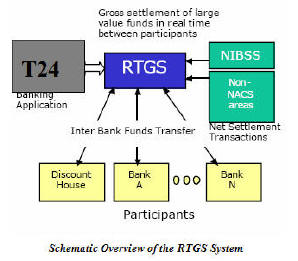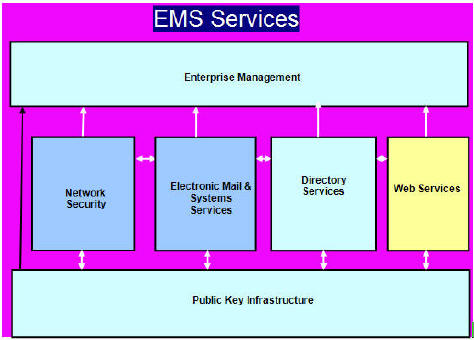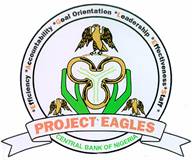Project EAGLES
Project EAGLES overview | Project Impact | IT Initiatives | Project Status Reports: 2006 | Project EAGLES Update
Project EAGLES IT Initiatives
The ERP Story
Central Bank of Nigeria's Enterprise Resource Planning (ERP) application is an Oracle-based package meant to automate the Bank's business processes. From day to day office activities like inventory, leave processing, payment orders to periodic processes like Payroll, General Ledger. The Oracle E-business suite application covers Human Resources (HR), Fixed Assets and Administration processes while the Decision Support System covers senior management reporting and analytical requirements.
The implementation is in phases; the year 2005 witnessed the roll-out of the HR Self Service module which hitherto was manually done. This deployment was significant as it ensured CBN staff adopt and experience do-it-yourself approach to automated processes in their daily work. Some of the on-line self-services are:
- personal data maintenance
- online appraisals
- online training environment
- loans processing which includes lump sum payment. This led to the integration of Oracle payroll and the Temenos T24 banking application.
- Other phases of Oracle ERP provide for the following:
- Centre-led procurement: Where CBN previously used distributed and paper based procurement, the new IT-based process ensures registration of the vendors centrally and purchase orders are centrally consolidated. It also ensures transparent audit trails of transactions and online business intelligence reports
- Account Payables & Asset Register: Online matching of invoices against purchase orders, automatic printing of cheques which has increased efficiency.. The system will also recognise, manage purchase and retirement of assets.
- General Ledger: This gives the Bank a centralised position of the balance sheet on a daily basis.
More on this as implementation continues.
Real Time Gross Settlement (RTGS)
The Central Bank of Nigeria is introducing a new application aimed at enabling world class settlement system in the Nigerian financial system. The system is based on the Real Time Gross Settlement (RTGS) application. The (RTGS) system is an inter-bank payment system through which high value funds transfer would be made between banks/participants on their own account or on behalf of their customers. This will reduce incidences of overdrawn accounts of banks with the CBN and the associated systemic risk in the industry. The system conforms to the Bank for International Settlement (BIS) Core Principles for Systemically Important Payment Systems.
The services to be provided by the system include:
- Funds Transfer including Third Party Transfer
- Net Settlement from Nigeria Automated Clearing System (NACS) and non-NACS clearing zones,
- Debit Entries, payments and charges
The participants of the CBN RTGS are the Central Bank of Nigeria, commercial
banks, discount houses and the Nigeria Inter Bank Settlement System [NIBSS] for
net settlement position of banks.

Operational run on the system with eleven selected banks, one discount house and NIBSS commenced in December 2005 and is on-going. The net settlement module of the application commenced "live" run on 16th January, 2006 along with the T24 "live" run. Final "live" run and cutover will be by mid 2006 when the outstanding 14 deposit money banks and 4 discount houses would have established the technical infrastructure for connection to the CBN - this process is at an advanced stage.
See Frequently Asked Questions on RTGS
Temenos T24 Appliocation Overview
The Central Bank of Nigeria, early in year 2003, decided to implement TEMENOS T24 to re-automate its core banking functions in line with the recommendations of the Project EAGLES on IT. This application would replace the existing banking application (BANKOS).
Features of TEMENOS T24
- Flexibility - The application uses default parameters to drive the functions of the system and the solutions can be tailored to meet the needs of the bank.
- Resilience - With TEMENOS T24, customer service is standard and secure.
- Scalability and Portability-The application allows the bank to improve application performance in a linear fashion.
- Security - Security is not a burden with the application (how?).
- Openness on all platforms (Database, Hardware and Operating System) - This feature enables the Bank to select the best vendor or environment to suit her needs within the context of cost, performance or any other factor.
![]() Key benefits
of TEMENOS T24 to the Bank:
Key benefits
of TEMENOS T24 to the Bank:
- Core administration of procedures in CBN banking operations
- Minimal risks associated with transactions, providing enhanced operational benefit, and promoting standards across the organization
- Tight integration with other IT initiatives, particularly the ORACLE FINANCIALS and the RTGS
- Significant reduction in errors and re-working of tasks due to in-built checks
- Comprehensive reporting functionality for Management Information System (MIS)
- Improved decision making through more timely, accurate and relevant information
- More efficient organisation through workflow and information flow.
- TEMENOS Internet Banking
TEMENOS T24 offers an internet banking facility to the external customers. This offers them the opportunity to carry out some transactions, make enquiries on their accounts, and benefit from some other online services the Bank will provide. Such services may include but not limited to:
- Access to Account Balances
- Printing of Statements
- Management of Local Security instruments
- Account Enquiries
- Foreign Currency Transactions - FOREX bidding and notification of bid results
Departments in CBN using the Application are:-
- Banking Operations Department
- Foreign Operations Department
- Trade & Exchange Department
- Currency & Branch Department
- Development Finance Department
- Finance Department
Enterprise Management and Security (EMS) Project
The Enterprise Management and Security (EMS) Project provides the foundation Information Technology (IT) infrastructure for the delivery of the re-engineered processes that would assist the Bank actualize its vision.
The EMS Project provides solutions for the followings:
- Enterprise Systems Management (ESM) (Using IBM Tivoli ESM - Availability and Performance management, Software Distribution, Historical Analysis and Trending for Proactive management of IT resources), Help Desk (Using Peregrine Software) and Network management of Cisco Devices (CiscoWorks)
- Delineation of network setup according to access requirements to the various zones. This is to ensure secure access to the network resources based on the access class of the users and the required information on "the need-to- know basis" without security compromise to the enterprise data.
- Configuration of e-mail services as an acceptable means of communication within the enterprise and with the rest of the world
- Deployment of web services on intranet, extranet and Internet zones as a means of disseminating information to stakeholders in each of the zones
- Deployment of Directory and other systems services to store the profiles of network resources (users, applications, devices, et cetera) for appropriate access as guided by policy definitions for such resources.
- Configuration of secure infrastructure for electronic data exchange within and outside the CBN enterprise in order to guarantee confidentiality, integrity, availability and non-repudiation of such transactions.
The diagram below is a high level overview of the EMS project.

Corporate Performance Management
Corporate Performance Management (CPM) is a three-tiered Performance Management System (PMS), which is intended to achieve a performance driven organization by managing performance at three different levels- enterprise, process and the individual.
The Oracle ERP implements the CPM in the following modules:
- eBusiness Intelligence (EBI)
- Enterprise Data Warehouse (EDW) for Macro Economic Analysis
- Enterprise Planning & Budgeting (EPB)
- Balanced Scorecard (BSC)
The Policies and Procedures module (PPM) is a custom development.
The CPM application will provide information in different forms and formats, which will assist the Management in monitoring the performance of the Bank while also providing a database for macro-economic analysis.
Status of Implementation of CPM
The following tasks have been accomplished on the CPM:
- Definition of key performance indicators (KPI) for the various business units
- Development of Strategic Business Unit (SBU) plans
- Development of Service level agreement (SLA) fo9r each SBU
- Development of strategy maps
- Building of Enterprise Scorecards
- Initial configuration and customisation
- Installation of production servers
- Installation of the Policy and Procedures module
Data acquisition, configuration of the modules, user acceptance testing and end user training are ongoing.


 Flickr
Flickr Instagram
Instagram LinkedIn
LinkedIn